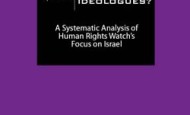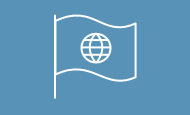Experts or Ideologues? Durban Strategy
The references for this article are available here.
The Durban Strategy
Active participant in strategy using human rights claims to advance the “complete and total isolation of Israel…the imposition of …comprehensive sanctions and embargoes, the full cessation of all links …between all states and Israel.”
HRW’s systematic ideological bias, lack of credibility, and disproportionate focus on Arab-Israeli issues take place in the wider context of the Durban Strategy. This was articulated clearly in the declaration adopted in the 2001 NGO Forum of the UN’s Durban conference, where HRW played a key role. Since then HRW has actively contributed to the exploitation of human rights claims to promote the agenda of anti-Israel boycotts and the broader demonization strategy adopted at the NGO Forum of the 2001 UN World Conference on Racism.
The Conference was ostensibly called to unite nations in the fight against “racism, racial discrimination, xenophobia, and related intolerance.” However, at the Asian preparatory meeting which took place in Tehran, Israel and Jewish NGOs were effectively excluded, while the Organization of the Islamic Conference (OIC) consisting of Arab and Islamic countries introduced language into the draft Declaration accusing Israel of perpetrating “holocausts,” “ethnic cleansing,” and “a new kind of apartheid, a crime against humanity,” and declared that Zionism “is based on race superiority.”
The conference consisted of three parallel forums: a diplomatic framework, a youth summit and a massive NGO Forum. The NGO Forum generated the most publicity and impact, aided by major funding from the Ford Foundation, the Canadian government, the UN, and others (Steinberg 2006). Some 7,000 delegates from 1,500 NGOs took part in this event. Participants adopted a declaration that demonized Israel’s responses to Palestinian terror attacks and attempted to delegitimize and isolate the Jewish state internationally through boycott and divestment campaigns. For example, Article 164 claimed that
targeted victims of Israel’s brand of apartheid and ethnic cleansing methods have been in particular children, women and refugees.
Article 425 announced a policy of
complete and total isolation of Israel as an apartheid state…the imposition of mandatory and comprehensive sanctions and embargoes, the full cessation of all links (diplomatic, economic, social, aid, military cooperation and training) between all states and Israel.
Furthermore, Article 426 talks of condemnation of those states
supporting, aiding and abetting the Israeli apartheid state and its perpetration of racist crimes against humanity including ethnic cleansing, acts of genocide.
This document formed the basis for the “Durban Strategy,” an ongoing political campaign, promoted by Palestinian and international NGOs determined to undermine the existence of the State of Israel.
Human Rights Watch played a significant role in this process, both at the conference itself and in the political campaigns which followed. As described above, Reed Brody led HRW’s delegation to the NGO Forum and despite his belated attempt to distance himself from the declaration (CNN Sept. 2, 2001) reports of HRW’s conduct at Durban indicate that Brody was clearly involved.
Notwithstanding its September 9, 2001 press release entitled “Anti-Racism Summit Ends on Hopeful Note,” which “criticized the media focus on the dispute over the Middle East” (HRW News Release Sept. 9, 2001), Blitt (2004) notes HRW’s distorted portrayal: “By scapegoating the media for reporting on activities within the NGO forum, Brody sought to downplay the very real and very virulent one-sided fixation with Israel manifested by the delegates themselves.”
Indeed, HRW’s active endorsement of the NGO Forum declaration is clear in subsequent reports and campaigns. These demonstrate obvious support for the Palestinian program of demonization, delegitimization, boycott and sanction campaigns. For example, following the October 2004 release of its flawed and one-sided report Razing Rafah, Human Rights Watch joined the broader boycott campaign (NGO Monitor Report Oct. 18, 2004). Sarah Leah Whitson wrote to Caterpillar (HRW Letter Oct. 28, 2004) urging it to suspend sales of its D9 bulldozer, “until it has assurances that the militarized bulldozer will not be used to commit violations of human rights and international humanitarian law,” and HRW published a press release on the same subject (HRW News Release Nov. 21, 2004). HRW also participated in a “Day of action” on April 13, 2005, to oppose “direct or indirect Caterpillar sales of home-crushing bulldozers to the Israeli military,” an event whose endorsers98 included radical pro-Palestinian groups, Israel Committee for House Demolitions (ICAHD), the Ireland Palestine Solidarity Campaign, and the International Solidarity Movement (NGO Monitor Press Release Mar. 23, 2009).
HRW’s approach to the Durban Review Conference (DRC), which took place in Geneva in 2009, showed some improvement, but still reflects a denial of the significance and extent of antisemitism at Durban 2001. In contrast to over 100 NGOs, HRW refused to sign the Magenta “Statement of Core Principles for WCAR [UN World Conference against Racism] Follow up” in January 2008,99 which expressed the need for a corrective movement to reverse the damage of Durban I and reassert the universality of human rights. However, HRW did release a “Position Paper on the Durban Preparatory Committee” (HRW News Release April 21, 2008) admitting that
the NGO forum at the Durban Conference undermined the wider process when the forum’s concluding statement singled out one country, Israel, as the target of exaggerated and unsupportable allegations and when certain forum participants made antisemitic statements and expressed antisemitic sentiments that targeted, among others, individuals participating in the conference.
HRW’s Geneva director Juliette de Rivero also wrote to the Libyan chair of the Preparatory Committee for the DRC on November 13, 2008 (de Rivero 2008), criticizing the “group of NGOs [that] have taken steps to promote the organization of an NGO Forum.” De Rivero wrote, “while Human Rights Watch remains faithfully involved in the Durban Review Conference, it does not support the proposal made by this or any other group to have an NGO Forum.” She called on all participants to “avoid a repeat of …the offensive behavior in the NGO Forum at the Durban Conference. There was no mention of the role of its own officials in the “offensive behavior” of 2001. HRW’s statement during the DRC attacked the governments of Canada, the US, and others for their refusal to participate, and ignored the speech delivered by Iran’s President Ahmadinejad (HRW News Release April 19, 2009).


